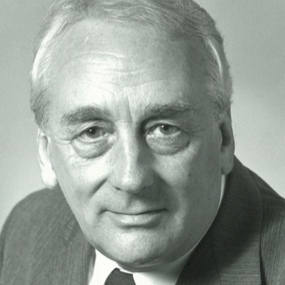News
Obituary: Ronald 'Nobby' Clarke
Friday 4 July 2014

Ronald 'Nobby' Clarke, a correspondent and editor in London, Saigon, Beirut, Washington, Chicago, New York and Los Angeles during a 32-year career with Reuters, died on 20 June 2014. He was 86.
London-born, Clarke (photo) began his working life as an editorial office boy in Fleet Street, then home of the British news industry. He joined Reuters as a sub-editor on the Central Desk in 1960 after spells with British United Press and The Daily Telegraph, and became UK Desk editor in 1965. He was posted to Saigon as bureau chief in 1968.
Four years into the Vietnam War, the United States had nearly half a million men involved in trying to defend South Vietnam against communist Viet Cong guerrillas and troops from North Vietnam.
Writing in the 2001 Reuters book Frontlines: snapshots of history, Clarke described vividly how he witnessed the napalm bombing of a Vietnamese village near a large American military base. He recalled villagers who had fled their homes streaming back to see a few brick walls pockmarked by bomb splinters in a big patch of fire-blackened earth. “This was strewn with the corpses of North Vietnamese soldiers, buffalos, cows and pigs. Some of the people sawed off the legs of the cows to eat, while aid workers, handkerchiefs over their mouths, threw lime on the bodies in front of the church.”
More vivid still, he described an incident that shook Reuters as few had done before.
“On a morning in May 1968, I had snatched a few hours’ sleep after working through the night, when I walked into the bureau to be told North Vietnamese and Viet Cong forces had again attacked the city. Two Reuters correspondents, Bruce Piggott and Ronald Laramy, had left to cover the fighting. ‘See you later then,’ Laramy shouted as they drove off with two other correspondents, Michael Birch, of the Australian Associated Press, and John Cantwell, of Time magazine.
“I filed reports on US and South Vietnamese briefings on what became known as the ‘Mini-Tet’ Offensive in a strangely silent bureau. Suddenly, the door was flung open. Frank Palmos, a freelance reporter who had been given a lift in the office car, burst in shouting, ‘They are all dead, they are all dead.’
“‘What are you talking about?’ I demanded.
“He said he had left the car just before it ran into a Viet Cong position and he had seen the four correspondents shot. One of them had shouted, ‘Bao Chi, Bao Chi!’ ‘Press, Press!’ to the Viet Cong. They mimicked him, ‘Bao Chi, Bao Chi!’ Then they opened fire.
“Our Vietnamese office manager Pham Ngoc Dinh immediately drove to the scene, to return with tears streaming down his face. ‘They are all dead,’ he said simply.
“Later that day I knelt on the floor at a US Army ambulance post and identified the four to a sergeant who stood over me, chewing gum.”
Clarke's time in Saigon was followed by a spell in Beirut, then London as a chief sub-editor on the World Desk and, in 1971, an assignment to the United States that would last the rest of his career. He worked first as news editor in Washington where he covered the Watergate scandal, and then moved to Chicago as chief representative in the Midwest, and in 1975 he became editor, general news, Reuters North America, based in New York. In 1978 he transferred to Los Angeles as chief of bureau, Western Region, RNA. He retired in 1992.
Clarke’s wife Norah died in 1999. He later married Belle, widow of the late Gordon Ditchfield, an editor with whom he had worked in New York.
The funeral will be on Tuesday 8 July at 2:30 pm at St George's Church, Anstey Buntingford, Herts. ■
- « Previous
- Next »
- 1119 of 2173